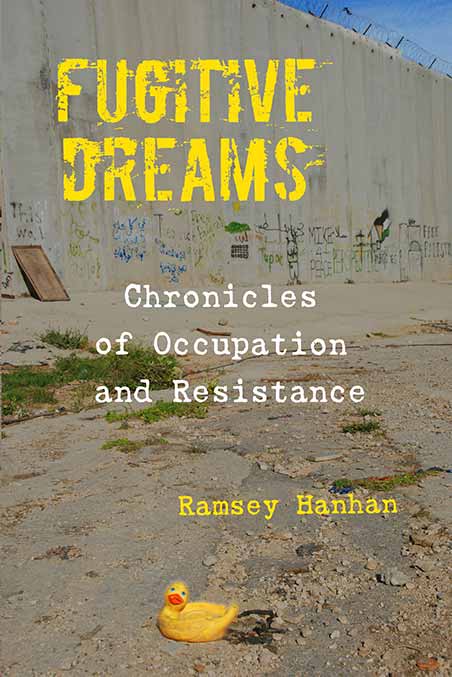Title: Fugitive Dreams
Author: Ramsey Hanhan
Publisher: Fomite
Genre: Literary Fiction, Fictionalized Memoir
First Publication: 2022
Language: English
Book Summary: Fugitive Dreams by Ramsey Hanhan
Fugitive Dreams is a slightly fictionalized literary memoir illustrating a sweeping 50 years of life under occupation through personal stories.
Born in Palestine ‘on the “wrong” side of the border, ‘ Sameer finds his way to America to rebuild his life. His immigrant experience in post-9/11 America is laced to the ongoing conflict at home with the common threads of school shootings, police violence, human rights abuses, activism, and walls. For the sake of his daughter, he decides he must do something.
Book Review: Fugitive Dreams by Ramsey Hanhan
In this long and lean, unafraid and bold, intricate and lyrical novel, Ramsey Hanhan achieves something that really is not supposed to work for those schooled in the culture of harsh individualism and nurtured in a world where it is usual to anticipate a brilliant spark of individuality shining through everyone. In Fugitive Dreams, Ramsey Hanhan breaks the convention of bringing a personal, individual story to the forefront. Instead, he chooses to focus on the collective set of experiences, the collective story of a mass, and the voices of many.
The author uses personal anecdotes in the book to paint a picture of life under Israeli rule over the course of half a century. The narrative follows Sameer B.R. Zaitoun, a Palestinian-born man, as he makes his way to the United States in search of a fresh start. Seeing little chance in military-ruled Palestine, Sameer, like many of his peers, had his sights set on immigrating to the United States. His immigration story in post-9/11 America is replete with references to school shootings, police brutality, human rights violations, and protests, all of which echo the unrest he left behind in Palestine.
Fugitive Dreams by Ramsey Hanhan was like a muffled scream. A scream that comes from the mouths of an entire generation. A generation, lost in time and space, of a handful of Palestinian men, women, and children who have migrated to a distant land with a distant dream. This book is full of shocking, poignant, and sublime moments, and it is delightfully fascinating, vividly evocative, and emotionally honest throughout. In addition to this, it is very generous as it is brimming with life, ideas, and characters, and it sheds light on the kinds of immigrant experiences that so many people go through but which are so seldom depicted in contemporary literature.
While this had a compelling story, it was the exploration of immigrant experience on a globalised scale that really drew the reader in. We are witnesses to how challenging it is to first obtain the appropriate documents in order to travel legally to these countries; once there, how people will treat you as different; exploitation; the difficulties of finding work; as well as the enormous issues concerning race and identity and how these are experienced. After all, it’s the plight of one, the quest of one, and the triumph of one that appeals to us.
Fugitive Dreams, like many other great novels, is a collection of the author’s observations on himself, others around him, and their circumstances. Because he had immigrated to the United States from Palestine when he was a teenager, Ramsey Hanhan had first-hand knowledge of the Israeli occupation of his home country as well as the challenges of starting a new life in a foreign land. These insights are portrayed through the perspective of the book’s primary character.
There was so much to feel, understand, and think about in this magnificent book that I’m having a hard time gathering my thoughts into one cohesive whole. And maybe this is precisely what needs to be understood. The life that is shown here is completely chaotic, and there is nothing cohesive about it. The characters are all fleeting constructions of their own imaginations, their own desires for survival, and their own need for validation. They are continually evolving, changing, re-evaluating, adjusting, and transforming into the persons they ultimately become, yet they are still always just a little bit short of their goals. The world, in all of its cruelty and unpredictability, is continuously driving them to bend, until some of them break in two while others bounce back even more strongly.
It was heartening to hear an outsider’s unfiltered and inspiring perspective on American politics, racial issues, relationships, education, and immigration. The all-encompassing empathy of the author for all human plights, for our idiosyncrasies and failures of the imagination, for our grit and stubbornness in the face of injustice, were encouraging. This book serves as a poignant reminder that each immigrant in the United States has a unique and often tangled history. I highly recommend it to anyone interested in the subject.






